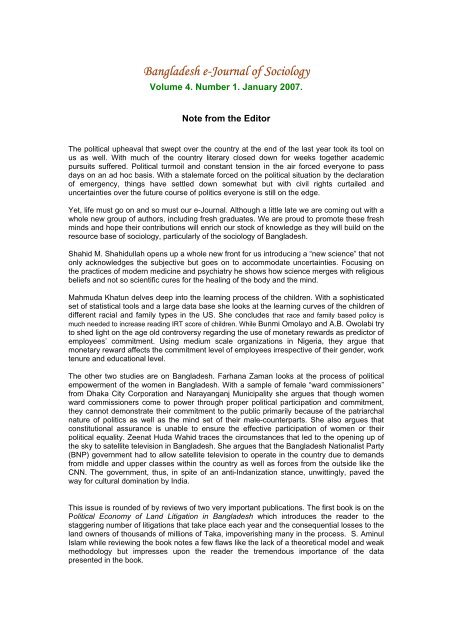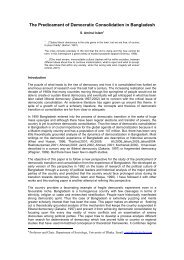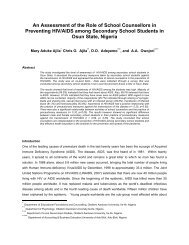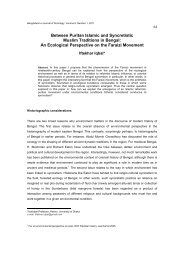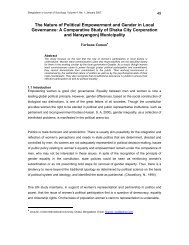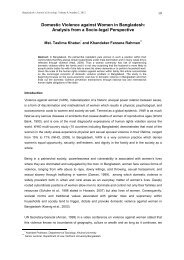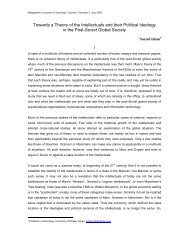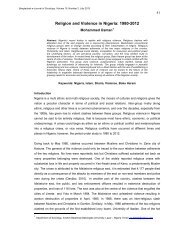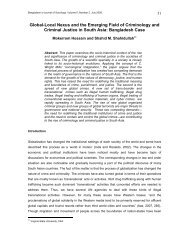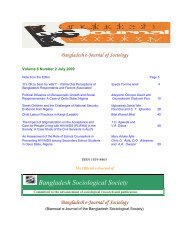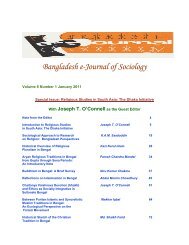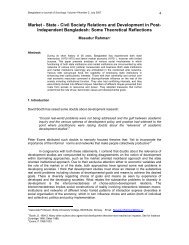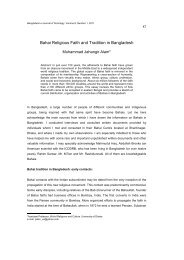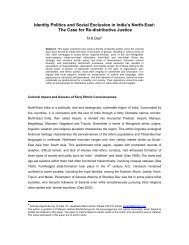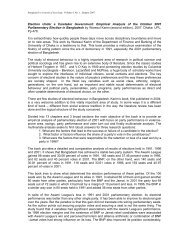Bangladesh e-Journal of Sociology - Bangladeshsociology.org
Bangladesh e-Journal of Sociology - Bangladeshsociology.org
Bangladesh e-Journal of Sociology - Bangladeshsociology.org
- No tags were found...
Create successful ePaper yourself
Turn your PDF publications into a flip-book with our unique Google optimized e-Paper software.
<strong>Bangladesh</strong> e-<strong>Journal</strong> <strong>of</strong> <strong>Sociology</strong>Volume 4. Number 1. January 2007.Note from the EditorThe political upheaval that swept over the country at the end <strong>of</strong> the last year took its tool onus as well. With much <strong>of</strong> the country literary closed down for weeks together academicpursuits suffered. Political turmoil and constant tension in the air forced everyone to passdays on an ad hoc basis. With a stalemate forced on the political situation by the declaration<strong>of</strong> emergency, things have settled down somewhat but with civil rights curtailed anduncertainties over the future course <strong>of</strong> politics everyone is still on the edge.Yet, life must go on and so must our e-<strong>Journal</strong>. Although a little late we are coming out with awhole new group <strong>of</strong> authors, including fresh graduates. We are proud to promote these freshminds and hope their contributions will enrich our stock <strong>of</strong> knowledge as they will build on theresource base <strong>of</strong> sociology, particularly <strong>of</strong> the sociology <strong>of</strong> <strong>Bangladesh</strong>.Shahid M. Shahidullah opens up a whole new front for us introducing a “new science” that notonly acknowledges the subjective but goes on to accommodate uncertainties. Focusing onthe practices <strong>of</strong> modern medicine and psychiatry he shows how science merges with religiousbeliefs and not so scientific cures for the healing <strong>of</strong> the body and the mind.Mahmuda Khatun delves deep into the learning process <strong>of</strong> the children. With a sophisticatedset <strong>of</strong> statistical tools and a large data base she looks at the learning curves <strong>of</strong> the children <strong>of</strong>different racial and family types in the US. She concludes that race and family based policy ismuch needed to increase reading IRT score <strong>of</strong> children. While Bunmi Omolayo and A.B. Owolabi tryto shed light on the age old controversy regarding the use <strong>of</strong> monetary rewards as predictor <strong>of</strong>employees’ commitment. Using medium scale <strong>org</strong>anizations in Nigeria, they argue thatmonetary reward affects the commitment level <strong>of</strong> employees irrespective <strong>of</strong> their gender, worktenure and educational level.The other two studies are on <strong>Bangladesh</strong>. Farhana Zaman looks at the process <strong>of</strong> politicalempowerment <strong>of</strong> the women in <strong>Bangladesh</strong>. With a sample <strong>of</strong> female “ward commissioners”from Dhaka City Corporation and Narayanganj Municipality she argues that though womenward commissioners come to power through proper political participation and commitment,they cannot demonstrate their commitment to the public primarily because <strong>of</strong> the patriarchalnature <strong>of</strong> politics as well as the mind set <strong>of</strong> their male-counterparts. She also argues thatconstitutional assurance is unable to ensure the effective participation <strong>of</strong> women or theirpolitical equality. Zeenat Huda Wahid traces the circumstances that led to the opening up <strong>of</strong>the sky to satellite television in <strong>Bangladesh</strong>. She argues that the <strong>Bangladesh</strong> Nationalist Party(BNP) government had to allow satellite television to operate in the country due to demandsfrom middle and upper classes within the country as well as forces from the outside like theCNN. The government, thus, in spite <strong>of</strong> an anti-Indanization stance, unwittingly, paved theway for cultural domination by India.This issue is rounded <strong>of</strong> by reviews <strong>of</strong> two very important publications. The first book is on thePolitical Economy <strong>of</strong> Land Litigation in <strong>Bangladesh</strong> which introduces the reader to thestaggering number <strong>of</strong> litigations that take place each year and the consequential losses to theland owners <strong>of</strong> thousands <strong>of</strong> millions <strong>of</strong> Taka, impoverishing many in the process. S. AminulIslam while reviewing the book notes a few flaws like the lack <strong>of</strong> a theoretical model and weakmethodology but impresses upon the reader the tremendous importance <strong>of</strong> the datapresented in the book.
The other book, Election under a Caretaker Government, is on the electoral participationprocess in <strong>Bangladesh</strong> focusing on the 2001 general election. The book seeks to explain the2001 elections in terms <strong>of</strong> the factors that influenced losses and gains in the parliamentaryseats for the two major political parties, the <strong>Bangladesh</strong> Nationalist Party and the AwamiLeague. S. Aminul Islam brings in his own expertise and experience in dealing with the workand finds in the book a very rare and extremely necessary examination <strong>of</strong> the democratizationprocess going on in the country.We hope that with these provoking essays <strong>Bangladesh</strong> e-<strong>Journal</strong> <strong>of</strong> <strong>Sociology</strong> will continue tomaintain the standard it has set for itself and claim its rightful place in the academic world.Nazrul Islam


